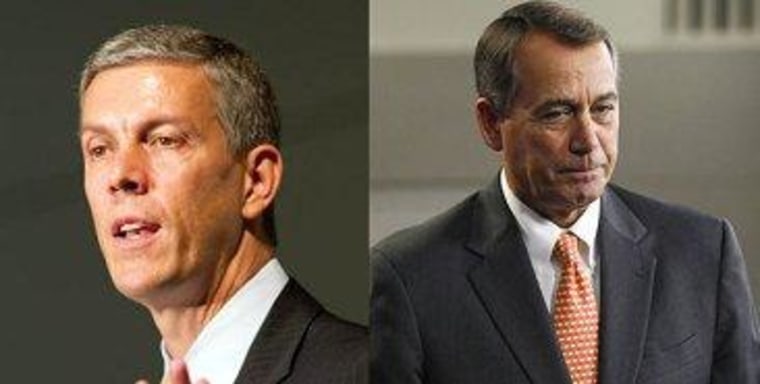Education Secretary Arne Duncan and House Speaker John Boehner both recently appeared on Sunday shows, made claims that were not true, and got caught. But it's worth pausing to appreciate how the two responded to the ensuing controversy.
Duncan, about a week ago, told CBS that "as many as 40,000 teachers could lose their jobs" as a consequence of the sequestration cuts. He added, "There are literally teachers now who are getting pink slips, who are getting notices that they can't come back this fall."
This was fact-checked and proven to be incorrect. When pressed for an explanation, Duncan acknowledged that he'd made a mistake, apologized, and set the record straight.
Seven days later, Boehner told NBC, "[T]here's no plan from Senate Democrats or the White House to replace the sequester." This, too, was fact-checked and also proven to be incorrect. Asked for an explanation, Boehner acknowledged that he'd made a mistake, apologized, and set the record straight.
No, I'm just kidding. Boehner's office actually doubled-down on the lie, saying the falsehood is true if Republicans are allowed to change the meaning of basic words.
With both of those "plans" easily found in official records and news reports, we asked Boehner's spokesman Brendan Buck how the speaker could claim that none exists."A plan must demonstrate it has the ability to pass a chamber of Congress to be worth anything. We've twice passed a plan. We're still waiting for the Senate to pass something, anything," Buck told PolitiFact in an email.
It would have been very easy for Boehner and his team to say, "The Speaker misspoke. Democrats have a plan, but we think it's an awful plan that would produce awful consequences."
But that would mean taking honesty seriously. Instead, the Speaker and his office have to argue, with a straight face, that they have their own definitions of the words "plan" and "is," which do not comport to any known dictionary.
In this case, Boehner said there is no Democratic plan. Reminded that there is a Democratic plan, Boehner's spokesperson says a plan isn't actually a plan unless it can pass the House or Senate. How did this conditional definition come about? They just made it up.
Told that the Democratic plan could pass the Senate fairly easily if Republicans stop filibustering it, the Speaker says ... well, he doesn't say anything, because it's a question he doesn't know how to answer.
If Boehner told the truth, it would make Republicans look even worse, so he finds it necessary -- indeed, he feels an obvious obligation -- to deliberately deceive the public, cynically hoping Americans are easily fooled by garbage talking points.
Duncan made a claim that wasn't true; Boehner made a claim that wasn't true. Duncan quickly acknowledged his mistake; Boehner quickly tried to redefine reality in ways that don't make sense. Duncan apologized; Boehner still wants to pretend his lie isn't a lie.
If you ever have the impression that the two sides of the political divide are playing by a very different set of rules, it's not your imagination.
